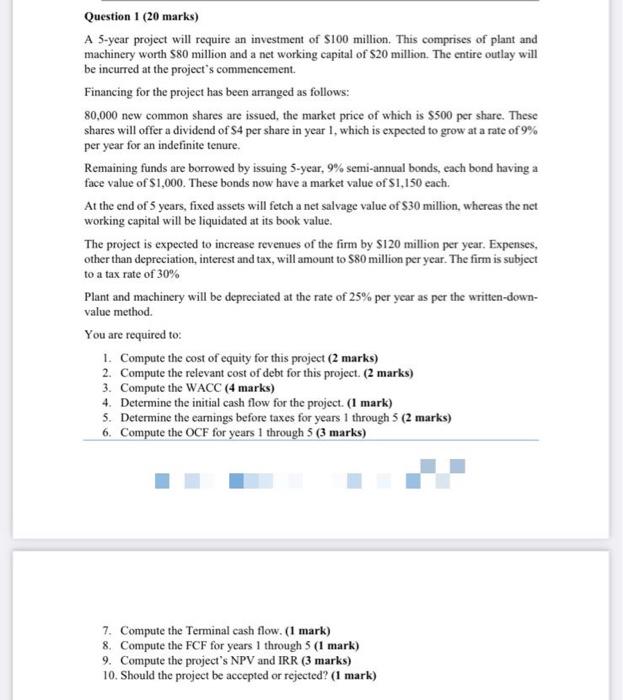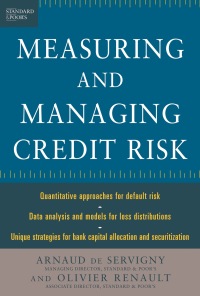Answered step by step
Verified Expert Solution
Question
1 Approved Answer
Please post ORIGINAL answers and answer all questions #1 - #10. Any answers copied from previously posted questions will be *REPORTED* Question 1 (20 marks)
Please post ORIGINAL answers and answer all questions #1 - #10. Any answers copied from previously posted questions will be *REPORTED* 
Question 1 (20 marks) A 5-year project will require an investment of S100 million. This comprises of plant and machinery worth $80 million and a networking capital of $20 million. The entire outlay will be incurred at the project's commencement. Financing for the project has been arranged as follows: 80,000 new common shares are issued, the market price of which is $500 per share. These shares will offer a dividend of S4 per share in year 1, which is expected to grow at a rate of 9% per year for an indefinite tenure. Remaining funds are borrowed by issuing 5-year, 9% semi-annual bonds, cach bond having a face value of S1,000. These bonds now have a market value of S1,150 each. At the end of 5 years, fixed assets will fetch a net salvage value of $30 million, whereas the net working capital will be liquidated at its book value. The project is expected to increase revenues of the firm by S120 million per year. Expenses, other than depreciation, interest and tax, will amount to S80 million per year. The firm is subject to a tax rate of 30% Plant and machinery will be depreciated at the rate of 25% per year as per the written-down- value method. You are required to: 1. Compute the cost of equity for this project (2 marks) 2. Compute the relevant cost of debt for this project. (2 marks) 3. Compute the WACC (4 marks) 4. Determine the initial cash flow for the project. (1 mark) 5. Determine the earnings before taxes for years I through 5 (2 marks) 6. Compute the OCF for years I through 5 (3 marks) 7. Compute the Terminal cash flow. (1 mark) 8. Compute the FCF for years 1 through 5 (1 mark) 9. Compute the project's NPV and IRR (3 marks) 10. Should the project be accepted or rejected? (1 mark) Question 1 (20 marks) A 5-year project will require an investment of S100 million. This comprises of plant and machinery worth $80 million and a networking capital of $20 million. The entire outlay will be incurred at the project's commencement. Financing for the project has been arranged as follows: 80,000 new common shares are issued, the market price of which is $500 per share. These shares will offer a dividend of S4 per share in year 1, which is expected to grow at a rate of 9% per year for an indefinite tenure. Remaining funds are borrowed by issuing 5-year, 9% semi-annual bonds, cach bond having a face value of S1,000. These bonds now have a market value of S1,150 each. At the end of 5 years, fixed assets will fetch a net salvage value of $30 million, whereas the net working capital will be liquidated at its book value. The project is expected to increase revenues of the firm by S120 million per year. Expenses, other than depreciation, interest and tax, will amount to S80 million per year. The firm is subject to a tax rate of 30% Plant and machinery will be depreciated at the rate of 25% per year as per the written-down- value method. You are required to: 1. Compute the cost of equity for this project (2 marks) 2. Compute the relevant cost of debt for this project. (2 marks) 3. Compute the WACC (4 marks) 4. Determine the initial cash flow for the project. (1 mark) 5. Determine the earnings before taxes for years I through 5 (2 marks) 6. Compute the OCF for years I through 5 (3 marks) 7. Compute the Terminal cash flow. (1 mark) 8. Compute the FCF for years 1 through 5 (1 mark) 9. Compute the project's NPV and IRR (3 marks) 10. Should the project be accepted or rejected? (1 mark) 
Step by Step Solution
There are 3 Steps involved in it
Step: 1

Get Instant Access to Expert-Tailored Solutions
See step-by-step solutions with expert insights and AI powered tools for academic success
Step: 2

Step: 3

Ace Your Homework with AI
Get the answers you need in no time with our AI-driven, step-by-step assistance
Get Started


